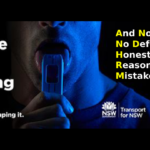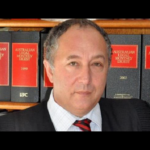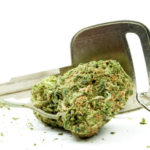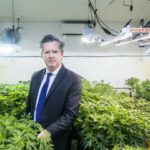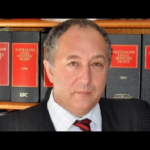Former NSW Magistrate David Heilpern Condemns Absolute Liability Drug Driving Ruling
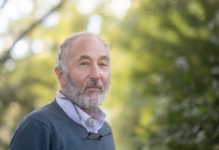
Right now, the New South Wales drug driving laws that facilitate police roadside drug testing are unjust, and, over the last decade, when this open secret has been raised in parliament, conservative MPs feign a lack of understanding regarding the complaint before them, rather than consider warranted reform.
The 1982 laws that implemented random breath testing for alcohol are based on scientifically confirmed levels of alcohol in a driver’s system, so if a driver fails the test, the device shows how far over the 0.05 legal drink driving limit they are, and they’re punished in line with that level.
Yet, 2007 drug driving laws are established on an injustice. They don’t test for levels of a substance but rather presence. This means traces of four illegal drugs trigger a positive reading, which does not indicate intoxication but only traces, and it means licences are being lost over unimpaired driving.
Most people who remain unaware of this injustice don’t believe it on first hearing of it. And since 2016, drivers have been regularly falling foul of the law for driving with traces of lawful cannabis medicine in their system, as although it was legalised, this has not been reflected in drug driving law.
A long term legal and community campaign to correct this injustice has been active, in particular since the Berejiklian government upped the number of annual roadside drug tests in late 2015, and the NSW Northern Rivers region became the major drug driving focus for NSW police.
In early 2016, then NSW Magistrate David Heilpern delivered the Carrall decision in Lismore Local Court, which resulted in the driver of a car being acquitted of a cannabis driving charge, as it was found that he’d consumed the cannabis that triggers a positive reading nine days prior.
But a February ruling of the NSW Court of Criminal Appeal confirmed a 2023 decision that found that drug driving is no longer a strict liability offence, which meant that the defence of honest and reasonable mistake of fact did apply, which was the case in Carrall.
This means that drug driving is now an absolute liability offence, as the defence of honest and reasonable excuse no longer applies, and nor does any other.
So, in NSW, if you test positive to drug driving whilst unimpaired or without knowledge of how this happened, there is no excuse.
The Carrall decision was one amongst a number of Heilpern rulings that bucked the trend, as he was becoming increasingly concerned about his courtroom being filled with people who’d tested positive to cannabis driving yet were unsure how the cannabis arrived in their system.
Heilpern gave up the gavel a few years back, in part because of the injustice of NSW drug driving laws.
Indeed, the former magistrate has since formed the Drive Change campaign and been vocal on the need to change these laws in general and as well, in terms of a medicinal cannabis defence.
Sydney Criminal Lawyers spoke to former NSW Magistrate David Heilpern about the finding that drug driving is an absolute liability offence, what it means to have unjust driving laws with no excuse and that the penalty of licence disqualification is much more serious than the ruling reflected.
On 19 February, a three justice panel of the NSW Court of Criminal Appeal provided a ruling regarding the law governing drug driving in this state, which lies under section 111 of the Road Transport Act 2013 (NSW).
The ruling upheld a 2023 NSW District Court appeal decision that saw Judge Mark Buscombe find drug driving to be an absolute liability crime, which means there is no defence of honest and reasonable mistake of fact.
Mr Heilpern, this means there’s no excuse for drug driving in NSW. What are your thoughts on last month’s ruling?
I’m extremely disappointed and surprised. This means that drug driving offences are now absolute liability offences.
That means it doesn’t matter how you came to have the drug detected in your saliva or in your blood or in your hair follicle, depending on however they want to take it, because it’s a zero reading that’s required.
This means that however it came into your system you are liable. There is no longer an honest and reasonable mistake of fact defence. I have three comments on that:
The first is the implications for this are well beyond drug driving. Clearly, this applies to low range PCA, and it doesn’t matter how the alcohol got into your system.
There is no longer a defence of honest and reasonable mistake of fact, which there had been up until this decision.
But it extends also, into a whole range of other traffic matters that are also absolute liability offences.
So, for at least thirty to forty years, there has been a defence to driving unlicensed, driving unregistered, driving uninsured: that there was an honest and reasonable mistake of fact that it occurred.
On this judgement, that defence likely no longer apply to those offences either. That is the first comment.
So, this is a ruling on just one law, how does that extend to all these other laws?
The criteria that were required were the context of the law and also a focus on the penalty that’s provided.
So, for example, driving unlicensed or driving unregistered or uninsured has even less of a penalty and no disqualification period that’s automatically applied or minimally applied.
So, they’re even lesser offences.
My view is that this will likely have impact on all those other offences, and they specifically distinguish low range drink drive from medium or high range drink drive, the latter of the two which carry the possibility of a gaol term.
So, this has serious implications for a whole range of offences and probably not just in traffic law either, but this will apply to summary offences as well.
So, the ripple effects will be felt for some time.
So, the way they’ve interpreted that law means that these other laws can now be interpreted in that manner?
The good word for me to use is that they are “likely” to apply to those offences.
Secondly, this judgement, when I first read it, I thought perhaps, and I hope, this will increase pressure on the government to change the drug driving laws.
I say that because this closes one of the only available defences to this offence and it means more people will be liable than were prior to this decision.
I had people before me drivers who didn’t know how they had drugs in their system. It may have been through casual contact. It may have been through a drink they shared. It could have been a spiked drink.
They just have no idea how the drug got into their system. They will now be liable.
There are now one million people who use medicinal cannabis in Australia. That is not the number of prescriptions, that is the number of people.
In NSW, I don’t have the exact number, but you would expect it to be somewhere around a third to a half of that totality. That means that they are running even more of a gauntlet than they were before, because they can’t rely on the defence of honest and reasonable mistake of fact, any longer.
The third comment is that the judgement itself is extremely disappointing and I’m critical of it, in one key regard: one of the factors that was found is that the penalty that is disqualification and fine is minor to use the words of the judge, Justice Chen.
Now, what he says is: “Whilst I accept that the suspension of a licence may bear heavily on a person, the loss or suspension of a licence ‘in the overall scheme of things… irksome though it may be, may be regarded as towards the bottom end of the scale of criminal punishment’.”
Now, while recognising hardship to use words like irksome is, in my view, out of touch with the reality of the gravity that people find themselves in when they lose their licence, in particular, in rural and regional Australia and NSW, but also, for those who rely on their licence for work.
It is not “irksome” to lose your job and your house, to lose the ability to travel or assist your children to sports or medical appointments.
That is not irksome, that is really serious. And it’s not just me who says that.
I sent you an email overnight with a full NSW Criminal Court of Appeal decision from 2004 by a preeminent criminal law judge in NSW, Justice Howie, who says: “Licence disqualification is such a significant matter and can have such a devastating effect upon a person’s ability to derive income and to function appropriately within the community that it is a matter which, in my view, must be taken into account by a court when determining what the consequences should be”.
So, in other words, previous courts have rightly recognised the devastating and serious effect well beyond irksome hardship, and I am really critical of his Honour Justice Chen for not finding that loss of licence is significant.
What he says is that you can rely on judicial discretion. Well, he may or may not be aware that magistrates have very limited discretion. Indeed, no discretion in some circumstances for this offence.
For example, if someone has been convicted of another major offence within the last five years, they can’t be dealt with by way of section 10 and keep their licence.
He also says that you can rely on prosecutorial discretion. Well, my experience in the area of drug driving, and speaking to a lot of my colleagues, is that prosecutorial discretion to withdraw such charges is nonexistent or extremely rare.
So, I am critical of the judgement because it is out of touch with the seriousness where people lose their licence. And had that been taken into account from a more practical and coalface perspective then perhaps the decision would have been different.
In the Facebook pages that I am on, and the discussion pages that I participate in, criminal practitioners who readily appear in traffic matters roll their eyes at the thought that someone would describe loss of licence as irksome and of not a serious consequence.
In my experience, nobody really cares about the fine. All they care about is whether they are going to keep their licence, because it is so crucial to so many people.
So, how come we’ve now got this one adverse ruling that’s likely to affect the manner in which all these other offences apply?
Law develops over time by exactly this sort of judgement, but it’s also a very clear indication where an injustice occurs as a result of interpreting a certain law in a certain way, or an injustice is increased, and then parliament can step in.
Of course, that’s what I would urge. I would urge them to have a very careful look at this decision to see if they think it is fair that if someone’s drink is spiked with cocaine at a pub, they have no idea and could not have any idea that cocaine was in their drink, that they should not have any defence whatsoever.
Or someone who uses cannabis three or four days before in accordance with medical advice and honestly and reasonably believe it won’t be in their system anymore, has no defence any longer.
That to me is an unfairness and courts have to interpret laws as they see them. But parliament rules the roost, and they could step in and ameliorate this injustice.
So, how would you describe the way this law is now operating in plain language?
It’s made a bad situation even worse. It was bad before. At least, there was a defence in some circumstances. Now, there is no defence. There won’t be a defence of honest and reasonable mistake of fact.
So, that means that a whole range of people who weren’t caught by this net, will now be caught by this net. And it increases the injustice that already exists.
As I said, there is now a million people using medicinal cannabis that means this is not a judgement, this is not a law, that only affects a few people.
This removal of the defence is in circumstances where it only applies to some people, and it just makes the situation much worse and much more urgently in need of legislative correction.
You and other drug driving law reformists established the Drive Change campaign in 2021, in order to promote the need for a medicinal cannabis defence for drug driving.
Legalise Cannabis NSW has a bill before parliament to facilitate this change and the Greens have a new one on the way, which is not its first.
Where does this all leave a medicinal cannabis defence for drug driving in NSW now?
It makes it more urgent. As I say, as it stands at the moment, it doesn’t matter how, if you knew, and it doesn’t matter when the drug entered your system, you are guilty.
This should mean that the bills that are being put forward and the proposed defences suggested, same as in Tasmania and the United Kingdom – all over the place where there is a medical defence, must see this then introduced in NSW.
By this time next year, there will be likely 1.5 million people using medicinal cannabis, because it is going to become so much more available as the medical profession accepts its medical uses, and these people deserve protection from criminal law.
These are not people sitting in a car, smoking a bong and then going for a drive. These are people who are significantly middle aged, using the drug for chronic pain and insomnia, a whole range of conditions, and they are much less affected than the medication that they were previously on.
Yet, they are criminalised, and now, the door has been shut to just about the only possible defence I can think of.
So, if that’s the case, why have the NSW, Victorian and South Australian parliaments repeatedly voted down proposals to enact this defence into law?
Well, I don’t think there is any logical reason. There are political reasons, and these people don’t want to appear to be soft on drugs and soft on road safety. But that is in appearance only.
There is big money in this field. There is big money for 200,000-plus tests in NSW. There is big money for Big Pharma, who would much rather people take an anti-anxiety pill every day for the rest of their life beyond medicinal cannabis.
The road safety industry itself keeps saying there is a high level of people with cannabis in their system who are killed in motor vehicle incidents and that is true.
But I am yet to see any evidence that any of them are medicinal cannabis patients using it in accordance with their prescription.
If you were going to see a road safety impact, you would have seen it in Tasmania, where those laws have been in place for many years now, or you would be seeing it around the world and you are not.
There is no increase in the road toll where this defence has become available, because it has built into it the kind of safeguards that you would want to see.
These include not being able to drive when you’re stoned off your brain, and that you can only have a defence if you use in accordance with a prescription from a doctor.
The reasons are political only and I sincerely hope that this judgement spurs parliament to action.
And lastly, Mr Heilpern, is there enough interest and debate going on about this decision that consideration of it will likely be on the agenda for NSW parliament?
I’m sure the decision will be given in the reasons in the introduction to change the law and introduce a medicinal offence by the Greens and Legalise Cannabis.
And I honestly don’t think there is much argument that this really widens the gate for those who are going to be liable.


